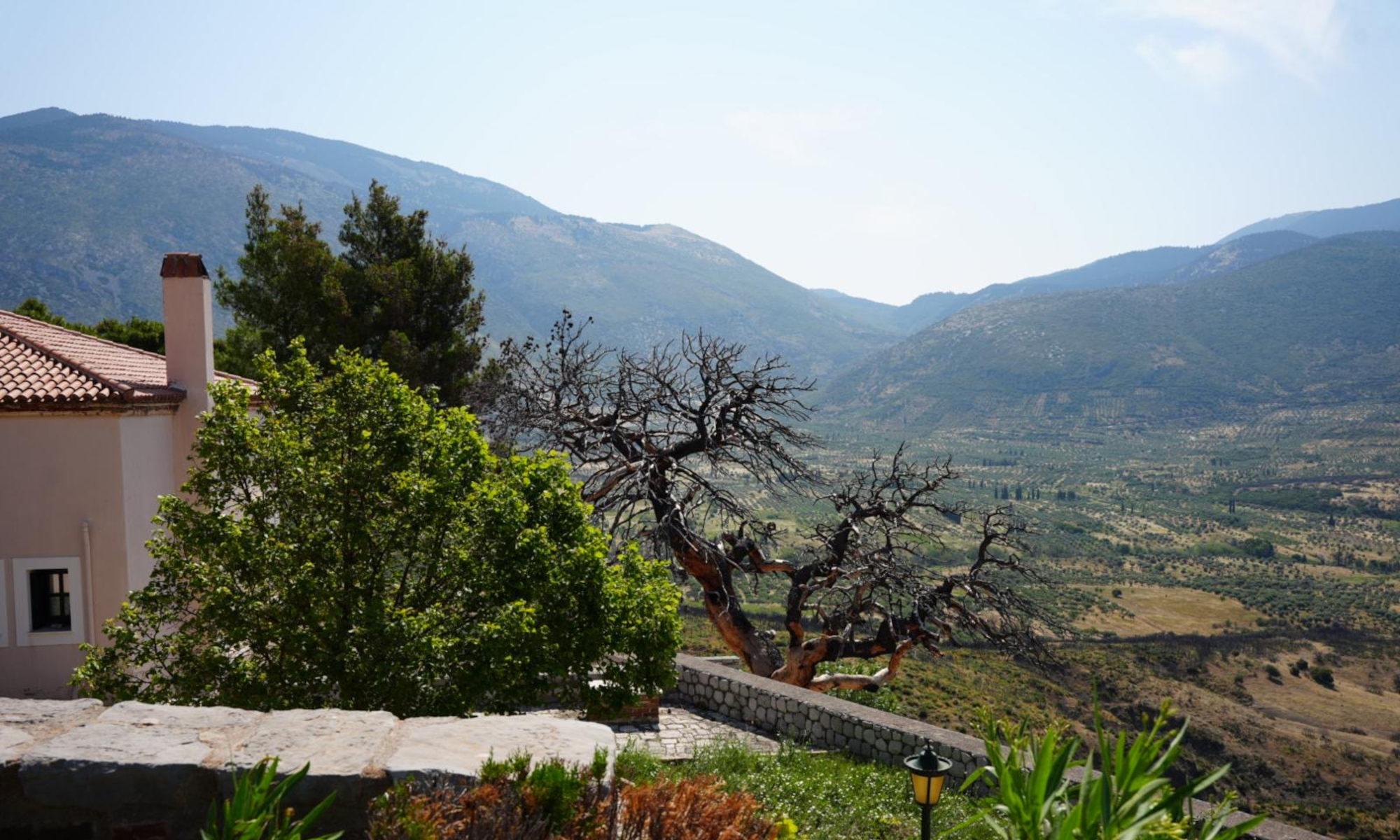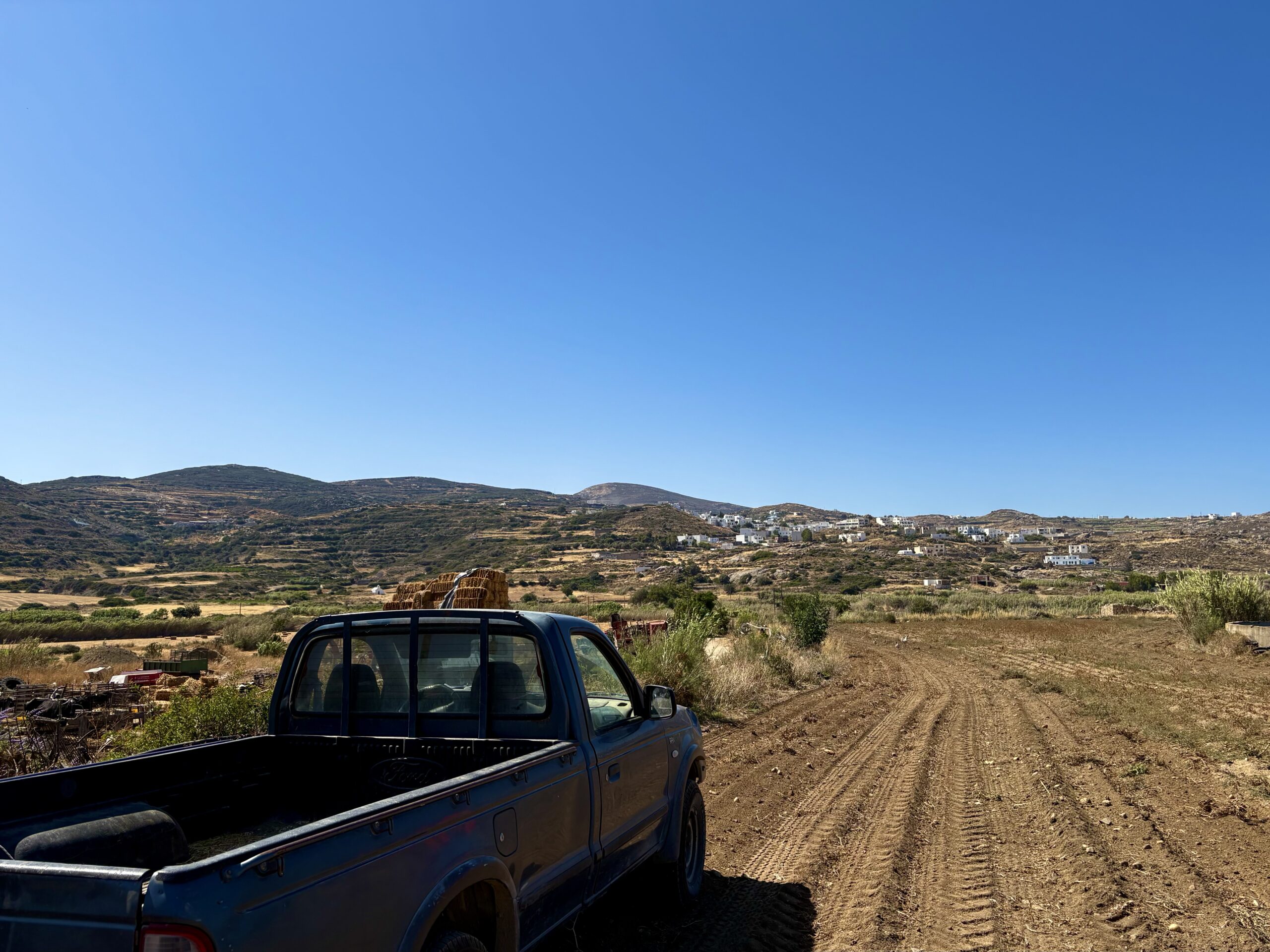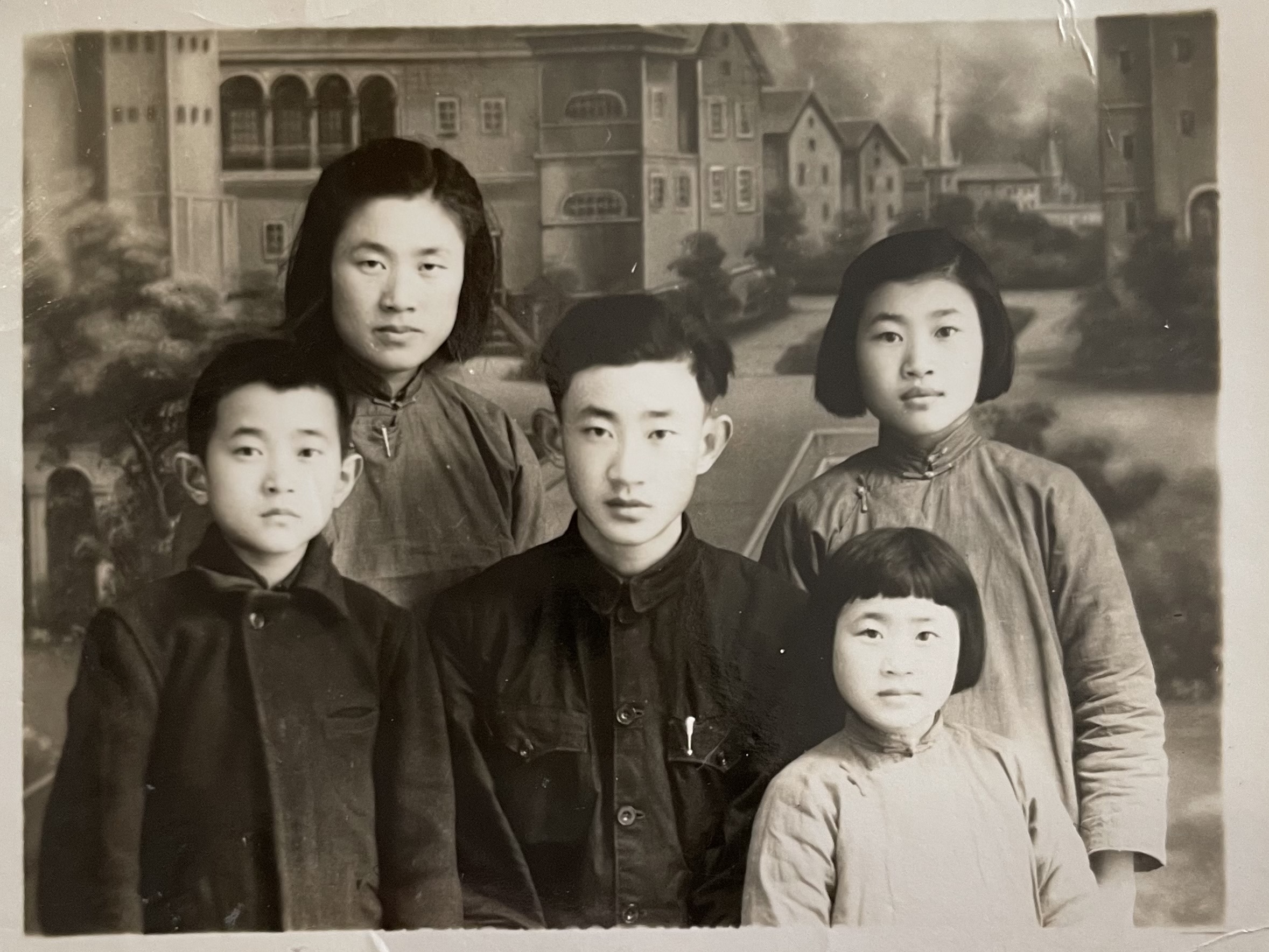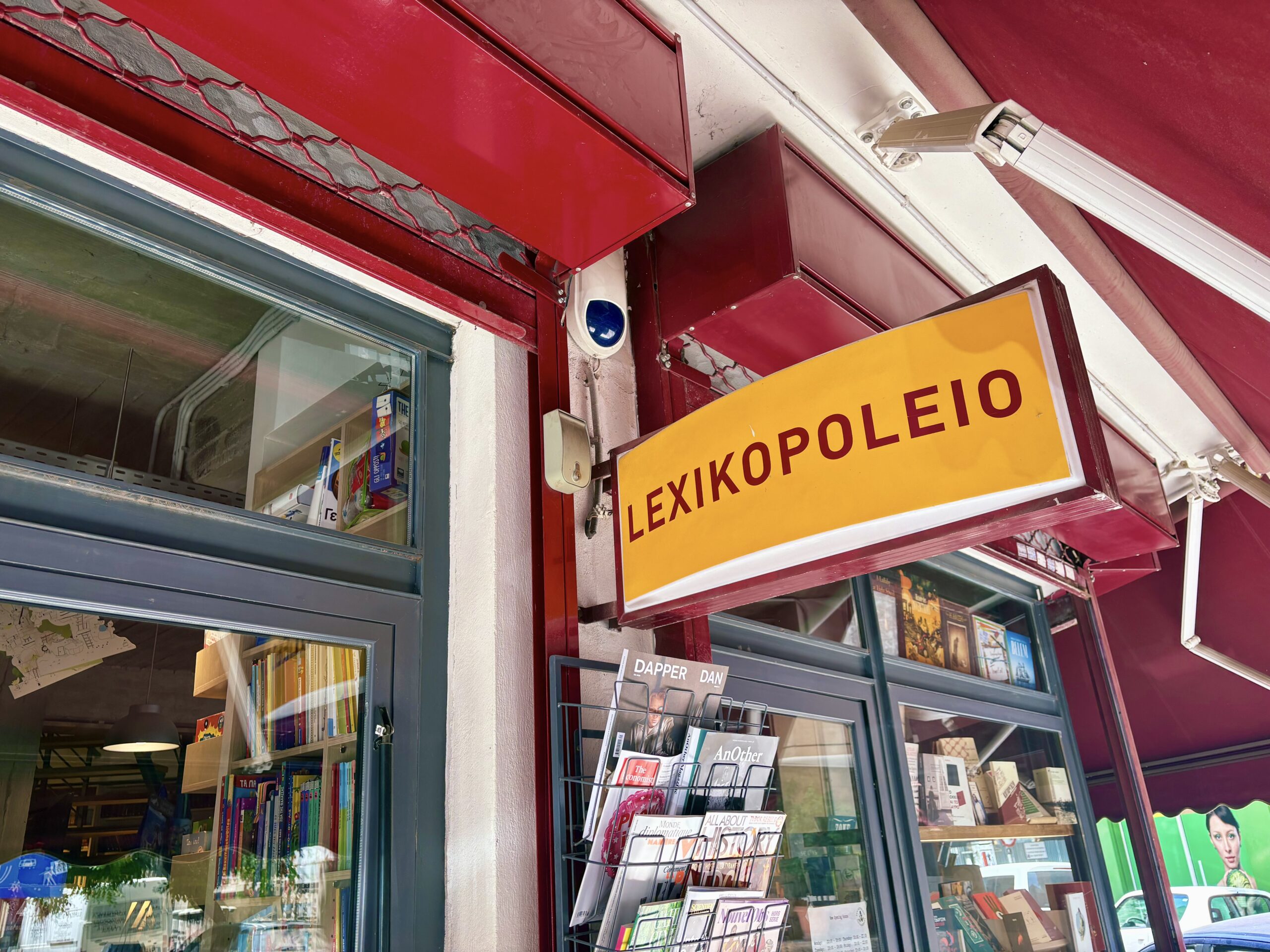They’ve documented wildfires, bailout negotiations, and migrant flows—all under someone else’s byline. Now, the Greek journalists behind the world’s images of a country in crisis are reckoning with what’s been left out.
By Vivien Wong and Isabella Dail
In late July, 2023, the Greek journalist Yannis-Orestis Papadimitriou nearly lost his life. That was always a risk: he had been hired by a group of Australian journalists to take them to the last wildfire left burning on the island of Rhodes. To give the reporters the best chance of catching the flames before they were extinguished, Papadimitriou had suggested they follow the fire brigade deep into the forest, then up to the blackened hilltop where the firefighters were stationed.
It was noon by the time he and the Australians reached the top of the hill. They were the only reporters there. Water-dropping planes skimmed low over the valley. The cameraman began to record. The fire was far away. Then it was up close: five meters from where the reporters were standing. With nowhere else to go, Papadimitriou and the other reporters launched themselves down the side of the hill.
Papadimitriou had already had one close call that summer, days after the Greek government began a mass evacuation of tens of thousands of people—mostly tourists—from the southeast part of Rhodes. But this second encounter with the wildfires was “far worse,” Papadimitriou said. In total, he and the other reporters fell down about a hundred feet of burned bark and ash. “My clothes were not in the best shape after that,” he recalled. Yet to his amazement—then, as now—he and the other reporters were unhurt.
Most importantly, the cameraman had the clip the team needed. But when the Australian network aired footage of the Rhodes wildfires that Papadimitriou had helped capture, his name wasn’t there.
Papadimitriou is one of many local journalists across the globe who are hired as news “fixers” by foreign media outlets to arrange (or “fix”) the logistics of their on-the-ground reporting. They are the indispensable—if often invisible—counterparts to foreign correspondents. They typically assist with translation and finding sources, but also bring to the partnership an invaluable fluency in local cultural and political dynamics.
But like many other Greek fixers, Papadimitriou can’t recall the last time he’s been credited by a foreign news outlet for a story he’s reported on as a fixer.
In 2016 and 2017, the Global Reporting Centre surveyed over 450 journalists across the world about the relationship between fixers and correspondents. The study found that while 60 percent of journalists reported rarely or never naming fixers in their published work, 86 percent of fixers would like the opportunity to receive credit.
Papadimitriou said he’s accepted anonymity as part of his job, though he still feels “a bit of bitterness” when a story for which he’s done the bulk of the reporting gets published without his name in the byline.
Like many journalists, after a piece he’s written gets published, Papadimitriou spends time reading the comments on his story. He obsesses over how his reporting has been received, and whether it’s stirred up any controversy. But for the pieces he’s worked on as a fixer, he has no such ritual. “I don’t see them as my own,” he said. “Even when I’ve contributed most of the reporting.”
*
In the last fifteen years, Greece has had its fair share of “crisis” headlines in international media. Foreign correspondents have flocked to Greece’s largest cities and smallest islands for pictures of austerity protests, waves of migrant boats, and raging wildfires. Much of the resulting international news stories has relied on the expertise of fixers like Papadimitriou. Yet since these local journalists have rarely been credited in the products of their reporting, it’s easy to miss how they’ve shaped international media coverage of their own country in crisis.
Papadimitriou, who’s worked as a part-time fixer in Greece for almost a decade, first started “fixing” to make ends meet as a journalist. “I started late, actually,” he said. By 2016, there already existed a generation of Greek journalists who had built up the country’s news fixing industry, predicated, in large part, on the 2009 economic collapse. John Psaropoulos, who has been Al Jazeera’s correspondent in southeast Europe since 2012 and covers Mediterranean geopolitics in the Substack Hellenica, was one of the Greek journalists who worked as fixers during the financial crisis in the early 2010s.
At the beginning of the financial crisis, Psaropoulos had considered leaving journalism for good. Athens News, the English-language newspaper where he was editor-in-chief, had gone bankrupt. All around him, major Greek newspapers, hit by budget cuts, were shuttering.
But even after his job with Athens News had ended, Psaropoulos found the Greek story “impossible to ignore.” He spent lunch breaks wandering down to Syntagma Square, a popular site for political demonstrations, to feel the “pulse” of the protesters.
“Greece was experiencing huge political and social unrest,” Psaropoulos, now fifty-six, recalled over a video call in July. “No one was sure if the Greeks would get the austerity measures passed, and therefore pick up their emergency loan, and therefore remain solvent, and therefore protect the euro.”
In international headlines, the stories about Greece were pointing to disaster: an unemployment rate over 20 percent, hungry pensioners driven to scavenge street markets for discarded fruit and vegetables, and violent demonstrations in the capital. Foreign correspondents and photographers “parachuting” into Greece to capture the economy’s collapse suddenly needed local journalists to interpret what was going on. Psaropoulos became one of these fixers. The crisis that had ended one path in journalism for him thus began another.
On February 12, 2012, riots erupted on the streets of Athens. It was Sunday, hours before Greece’s broad coalition government would pass a package of unpopular austerity measures—including public-sector job cuts and reduced minimum wage—to secure a second bailout from foreign lenders, including the European Union and International Monetary Fund. More than 80,000 people across Athens had turned out to protest, many of them gathering in Syntagma Square, just outside the Greek Parliament building where politicians were debating the controversial budget cuts. From their room on the fifth floor of the Athens Plaza hotel, which overlooks Syntagma Square, Psaropoulos and his colleagues from Al Jazeera prepared to deliver the first live broadcast of the day.
The demonstrations soon turned violent. Some protesters took hammers to the steps of the Athens Plaza hotel and were hurling the broken marble chunks at riot police, who responded with tear gas and stun grenades. The hotel was shut down “like a fortress,” Psaropoulos remembers. The lobby was empty, save a few receptionists in heavy-duty gas masks. Tear gas seeped through the cracks under the front doors, so much that Psaropoulos wept as he walked through.
Tim Friend, Al Jazeera’s London-based correspondent, had flown in to cover the riots with Psaropoulos. Every morning, over coffee, Psaropoulos translated the Greek newspapers for Friend and explained what the latest political developments meant for Greece’s economy. “You’re not a financial expert,” Friend recalled of his time as a general reporter in Athens. “And you know in a couple of hours you’re going to be in front of a camera.”
Reporters—many of them foreign correspondents, like Friend, who’d come straight from the tarmac—had booked almost every room of the Athens Plaza. After fifteen years as a journalist in Greece, Psaropoulos recognized almost none. But the hotel room that he and his Al Jazeera colleagues had transformed into a live broadcast point was filled with these journalists. They wanted to know what was going on. They had heard Psaropoulos was the journalist who spoke Greek.
During the riots, Psaropoulos locked himself in the bathroom of his hotel room to write a script for Al Jazeera’s broadcast that day without interruption. But between shifts, he emerged to transcribe parliamentary debates, translate the television feed, and explain the slogans being shouted by protesters in Syntagma Square for the correspondents who knew no Greek.
Though journalists were flocking to the sites of violent protests and burning buildings, Psaropoulos believed that the real news was occurring inside Parliament. “It was easy for people to report—and they did—that the people of Greece were spontaneously erupting in protest because they were so deeply unhappy with what’s going on,” he said. “They were, but the street protests were also the result of party political organizing.” The protesters’ slogans, he explained to journalists, had been written in center-left and left party headquarters; what was happening was organized.
“He knew the background, he knew the story,” Friend recalled of Psaropoulos. “Not that I ever thought ‘fixer’ was a subordinate role—it isn’t, in my mind. But he’s a great writer and a great journalist in his own right. I once said to him, ‘Why do you need me?’ He could do it all.”
*
In his 2022 book “Fixing Stories: Local Newsmaking and International Media in Turkey and Syria,” sociologist Noah Arjomand describes fixers as consummate “information brokers.” “Fixers are producing what will become the news about the world that shapes everybody’s perceptions of what’s going on,” Arjomand explained on a recent call.
In April, 2024, prior to parliamentary elections across the E.U., Sue Reid, Special Investigations Editor for the British center-right tabloid newspaper Daily Mail, traveled to Greece for two days to cover Europe’s new far right. Far-right nationalist movements in countries like Spain, she believed, could be traced back to Greece—where, as she explained over the phone in July, “the extremes have harnessed themselves to migration.”
In 2015, the number of migrants and refugees entering the E.U. spiked, the majority of whom landed in Greece. Proximity to Turkey, a major transit point for those fleeing conflict and persecution in the Middle East, made Greece the main entrance to Europe. Anti-immigrant, ultranationalist sentiments once platformed by former far-right political party and convicted criminal organization Golden Dawn found fertile ground in the unfolding migration crisis. The 2023 election of three new far-right parties—Spartans, Greek Solution, and Victory—seemed to signal a lasting political shift in Greece, one that could be extrapolated to the rest of Europe.
Tony Rigopoulos, then working as editor-in-chief of the left-wing Greek newspaper Documento, became Reid’s fixer. For two days of fixing, he was paid 700 euros—almost three times his weekly salary from Documento. “I was very happy with the money,” Rigopoulos, who is thirty-five, recalled a year later. “But I’m not sure if I would do that story again.”
Reid told him she wanted to talk to far-right Greek parliamentarians. Rigopoulos gave her a list; he set up the meetings. In one interview, a member of Greek Solution spoke against recent waves of migration. It sounded a lot like Golden Dawn. Rigopoulos, who is part-Jordanian, remembered feeling uncomfortable by the comments. “When I heard the guy speaking about being ‘completely Greek’ and having the ‘culture’ being blended in with other cultures—and how bad that is—it was kind of pinching me in a very soft spot,” he said. But he translated word for word. “He was completely efficient and non-political as a fixer,” remembers Reid. “He did his job properly.”
Still, Rigopoulos worried about what might happen if the piece lacked the perspectives of local Greeks. While Reid wrote in her hotel, Rigopoulos took her photographer to a general strike in Syntagma Square to gather protesters’ opinions about Greece’s far-right.
None of those quotes would appear in Reid’s story. The article turned out to be much less critical of the far-right Greek parliamentarians than Rigopoulos had expected. Initially, he’d hoped Reid might credit him somewhere. “But when I started reading, I thought, ‘Thank God she didn’t,’” he said. “It wasn’t really a representation about what the far right is in Greece.”
Some international media outlets operate on what Arjomand calls an “extractive model,” where foreign correspondents, usually from the West, come with a pre-fixed story based on stereotypes or the views of the outlet’s audience. In these situations, the fixer is there “just to fill in the blanks,” Arjomand said.
Rigopoulos has learned to sense when this is the case. It’s a specific attitude some foreign correspondents carry, “a feeling of ‘I’m the journalist, you’re just translating or driving me or doing those things for me,’” he explained. “They don’t consider you their colleague.”
Perhaps the most striking finding from the Global Reporting Centre’s study was the disconnect between the way fixers and foreign journalists experience their collaboration. Nearly 80 percent of fixers said they’d challenged the editorial focus of a piece, compared to less than half of journalists who said they’d been questioned or challenged by a fixer. Tellingly, the report states that many of the journalists interviewed in the study “bristled” at the idea of relying on fixers for editorial guidance; many considered it “inappropriate” to be corrected by a fixer about the content of a piece, since the fixer would be “crossing over into the professional role of a journalist.”
Through each step of on-the-ground reporting, fixers like Rigopoulos make possible the stories that, in turn, will define Greece’s political landscape for an international audience. Even so, the narrative often comes out different from the way the fixer would like it to. “You have no control when you’re working as a fixer,” Rigopoulos said. “You follow the angle of the journalist.”
*
The circle of Athens-based fixers is small and tight-knit. Many of these journalists have worked with the same international news outlets, if not the same correspondents. Others, like Papadimitriou and thirty-nine-year-old Valentini Anagnostopoulou, encounter each other on the reporting trail. Since they met five years ago—while reporting on the trial of an English footballer on the island of Syros as correspondents—the two fixers have overlapped on a few more assignments, including Rhodes wildfires in 2023.
That summer, Anagnostopoulou remembers receiving a text from Papadimitriou shortly after his run-in with the wildfires, warning her to stay away from the part of the island where he’d nearly died. But after the last wildfires on Rhodes had been extinguished, Anagnostopoulou was approached by Dutch reporter Bram Vermeulen, with whom she’d previously collaborated, about a documentary he wanted to direct about that summer; it would be titled “Everybody Goes to Rhodos.” Vermeulen hoped to make the island of Rhodes an entry point to a tension at the heart of Greece’s economy: tourism, an industry that accounts for a third of Greece’s G.D.P., puts extreme pressure on its natural resources and local communities, thereby exacerbating the effects of climate change.
By the summer of 2024, the rebound of hotels, tavernas, and beach bars on Rhodes—all with the purpose of welcoming more tourists (a record-breaking 3.5 million between January and September 2024, compared to the island’s 125,000 inhabitants)—was staggering. There was little on the island to suggest the scale of devastation that had taken place there the previous year. “The Greek government did everything it could to forget the fires quickly,” Vermeulen says in the documentary, noting, upon entering a bustling hotel that had burned to the ground only a year before, “The lobby smelled like fresh paint. It was like nothing had happened.”
Anagnostopoulou’s work began before Vermeulen’s arrival: contact out-of-work fishermen, obtain permission to film at luxury resorts, and set up interviews with a local firefighter (who would become the documentary’s central character). In one scene from “Everybody Goes to Rhodos,” Vermeulen asks the firefighter about the sustainability of the tourism industry. Explaining that the islands simply can’t handle the number of tourists coming every summer, the firefighter says, “Many hotels already have problems with water. Imagine how difficult it was for us to find water to extinguish the fires last year.” But he grins when Vermeulen suggests the possibility of capping tourist numbers. “No,” he says. “That would mean a revolution here. Because they live from this.”
The interview lasts just a few minutes; in the next scene, Vermeulen is seen entering the lobby of the rebuilt Rhodes hotel. But during filming, the firefighter’s candidness about the limited resources available to cope with overtourism had triggered the fire service’s press office in Athens. Anagnostopoulou, the only Greek-speaking member of production, became the de facto go-between for the firefighter and his superiors.
While continuing to film the documentary on Rhodes, Anagnostopoulou began receiving private messages from the firefighter, explaining that he was under pressure from his superiors to stop talking to the reporters. Vermeulen didn’t seem bothered by the firefighter’s situation. His priority, Anagnostopoulou knew, was to “get as much as possible from the outspoken source, at any cost.” Anagnostopoulou’s goal was the same—to get the story—but she remembers simultaneously feeling an “obligation” to protect the firefighter and “not screw him up.”
In “Fixing Stories,” Arjomand describes the intermediary role of fixers, who, as part of their job, must learn to move easily “between reporters and sources, between worlds with different cultural and political norms.” Fixers’ “in-betweenness,” the very quality that renders them invaluable as journalists, simultaneously makes them more vulnerable to pressure from both sides.
Years of fixing, Anagnostopoulou believes, have made her a shrewd negotiator. Any hiccup during reporting—whether a negative exchange with a government official or an accusation of unethical behavior—carries consequences far more serious for the fixer than for the foreign correspondent. A correspondent’s faux pas can cost Anagnostopoulou relationships she’s built over her entire career. Unlike the correspondent, who can head home after the assignment is over, she said, “I will have to keep working in the same country with the same contacts, the same sources, the same authorities.”
*
In “The Problem with ‘Fixers,’” published by the Columbia Journalism Review, India-based journalist Priyanka Borpujari offers a compelling diagnosis of a power dynamic at the heart of many fixer-correspondent relationships. “The difference between a correspondent and a ‘fixer’ is not one of experience or qualification, but of geography,” she writes. “Local journalists hired as fixers by foreign journalists are often established reporters and can offer in-country expertise in the form of helpful contacts and language skills.” What they lack, compared to their foreign counterparts at the New York Times, for example, “is the big-name cachet that in the end only money can afford.”
To be fair, every fixer-correspondent relationship is different, and many foreign correspondents are aware of the power dynamic embedded into their interactions with fixers. The “respectful ones,” Papadimitriou said, “understand that the reason you’re now working as a fixer is because they’re coming from a stronger economy and you’re living in a weaker one.” That’s what turned him from a journalist into a fixer. “It’s purely money,” he said. “That’s it.”
If financial incentive is what persuades many Greek journalists into the fixing profession, there are other reasons fixers decide to stay. Anagnostopoulou, who has transitioned to working full-time as a fixer with international news outlets, finds greater freedom in the stories she’s able to cover when reporting for a foreign newspaper than when reporting for Greek media. For one, “Everybody Goes to Rhodos” would never be produced by a major Greek broadcaster, she believes; the country’s dependency on tourism is too sensitive a subject. Any local journalist who scrutinizes the impact of mass tourism openly in the Greek press runs the risk of being cast as a “traitor.”
In this regard, Anagnostopoulou counts herself lucky: receiving credit for her work on a controversial piece of journalism—as she did for “Everybody Goes to Rhodos”—doesn’t present an ethical dilemma. “I will still get jobs,” she said. “I don’t work in a big mainstream newspaper that can get orders from a government and tell them, ‘fire that person’ or ‘demote her.’” For many part-time fixers, including Papadimitriou and Rigopoulos, who work simultaneously for Greek and international news outlets, that assurance runs thin.
In 2025, Greece ranked worst among countries in the E.U. for press freedom, according to a report by Reporters Without Borders, for the fourth year in a row. For Anagnostopoulou and fixers like her, working with a foreign correspondent can provide a platform to tell the Greek stories that they can’t tell in Greece. “Everybody Goes to Rhodos,” with its angle against mass tourism, “would have been impossible for me to do without foreign media,” she said.
Fixers have many reasons for staying in the profession—reasons, still, not altogether dissociable from the geography that delineates fixers as fixers in the first place.
*
In recent years, Yannis-Orestis Papadimitriou has noticed fewer and fewer cameras in what were once hotspots for foreign journalists: Syntagma Square, the Moria refugee camp, Rhodes’ blackened hills. Papadimitriou offered his own explanation: “Interest has waned,” he said, “because they couldn’t get these sensational images of wild demonstrations with things burning, tear gas.”
Papadimitriou has a term for the genre of news that international media has often looked to Greece to supply: ‘crisis porn,’ a steady diet of “wild demonstrations” and “pictures of poverty” that feeds a global appetite for spectacle. “And now, crises are still happening in Greece,” he said. “But they’re not as loud.” The challenge for Papadimitriou and his colleagues remains: How do Greek journalists train foreign cameras on the places—courtrooms, union headquarters, municipal offices—where the real news, the churn of political change, is taking place?
On February 12, 2012, a few hours before his first television script for Al Jazeera—an analysis of the protests that day—would go live, John Psaropoulos remembers asking himself the same question. The answer, a decade and some change later, has only grown more complex for Greek fixers.
Since most foreign media have moved elsewhere, so has their money. “When Greece stopped being a very hot topic,” Rigopoulos said, “we started losing jobs as fixers.” Those who still find work face the disquieting irony that steady employment depends on a country falling apart.
But the lull is only temporary—at least, that’s what Psaropoulos believes. “You know, will Greece generate stories? It will,” he said. “Greece, compared to any other country of similar size, punches way above its weight in terms of news headlines. So if you’re patient, eventually you will get another major story.” ♦
Valentini Anagnostopoulou contributed reporting.




